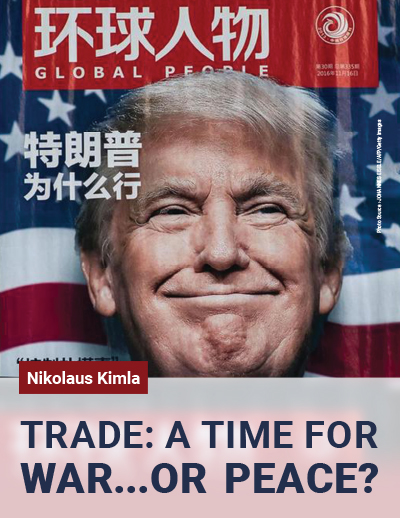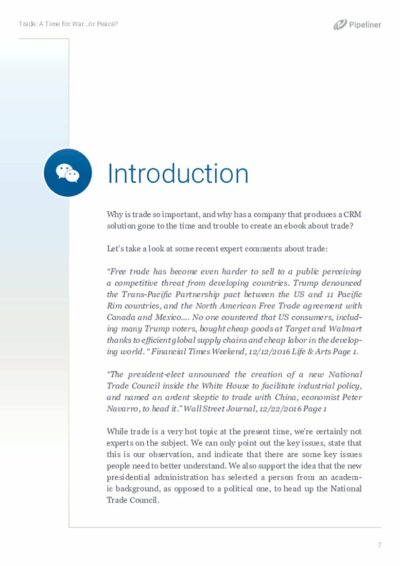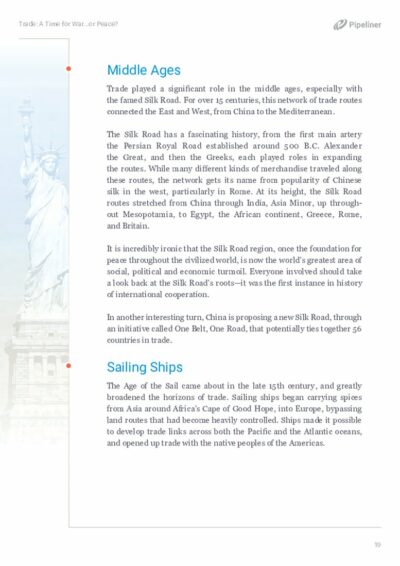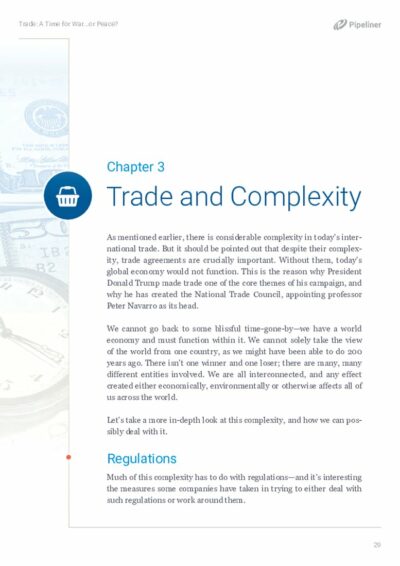
Trade: A Time for War…or Peace?
With Donald Trump’s re-election to the presidency, we are reintroducing this e-book on trade, which now features a new foreword and updated insights on Pipeliner CRM. Trade has again taken center stage in the early months of Trump’s second term.
Originally written right after Trump’s 2016 victory—but before he officially took office—this e-book was created when the direction of his presidency was still uncertain. Now, with the benefit of hindsight and new developments, we revisit this topic with fresh perspectives.
Nikolaus Kimla CEO of Pipeliner CRM outlines the reasons why understanding trade is important in the present world and explains why a CRM solutionSolution Solution is a combination of ideas, strategies, processes, technologies and services that effectively helps an organization achieve its goals or hurdle its challenges. vendor, Pipeliner CRM, has produced an ebook on this subject, since trade is intimately related to sales and economics. It also offers a brief mention of the early analyst opinions on global supply chains and trade skepticism.
Chapter 1: A Brief History of Trade:
This chapter gives an overview of the development of trade from the barter system of the ancient times and the creation of the money to the importance of historic trade routes, such as the Silk Road, and the formation of the modern trade agreements. It stresses that trade is one of the oldest activities that exist among humans.
Chapter 2: Liquidity and Currency:
This chapter explores the origins of money and liquidity beginning from prehistoric barter trade to the present virtual money like Bitcoin and the role it playsPlays Plays is an engagement strategy, set of actions, series of tactical steps, or an agreed upon selling approach developed to be repeatable and customized to deliver the highest likelihood of closing a deal with a specific group of prospective customers during a set period. in the efficiency of trade. It also mentions the controversy between commodity-backed and fiat currencies.
Chapter 3: Trade and Complexity:
This chapter looks at the growing complexity of world trade and examines how factors such as regulations, taxes (including VAT) and geopolitical events (e.g. Brexit) affect trade. It also introduces the cybernetics as an approach that can be used to help understand and manage complexity in the trade context.
Chapter 4: What Trade Should Be Like Today:
This chapter describes the ideal properties of the trade in the modern world, and stresses the importance of the business involvement in the formation of the trade agreements and the necessity of the global approach for companies and sales people. It reiterates the fact that trade is vital for economic development.
Chapter 5: How Pipeliner CRM Helps to Manage Trade in the Modern World:
This chapter describes how Pipeliner CRM assists organizations in managing the dynamics of world trade by offering the technology that helps in enhancing the sales functions in the global market. It describes characteristics such as the currency, mobility, and simplicity of the tool. The section also focuses on the trust and recommendations as key factors that shape trade.
Learn More About Pipeliner CRM
Take a no-obligation 14 day trial of Pipeliner CRM.
No credit card info required – just experience for yourself how it could impact your sales.
Additional Resources
This ebook is on the subject of “Win Together.” It falls under the same context as“win-to-win” described in my book Network Selling: Guarantee Success for the Digital Age. Today, this aspect of sales is more important than ever, and must also be part and parcel of CRM solutions.
“For some years I’ve been saying that, as a society, we’re in the midst of a transformation. Given what’s happened in the last couple of years, there’s no one left who is disagreeing with me! It’s become very obvious.”
 Nikolaus Kimla, CEO at Pipelinersales, Inc.
Nikolaus Kimla, CEO at Pipelinersales, Inc.A common term in sales today is EQ, which stands for “emotional I.Q.” It means the skill a salesperson has in reading emotions and utilizing them in sales. It means empathy and a number of other abilities. The short version is, it’s an I.Q. when it comes to emotions. But just as with our Network Selling model, E.Q. isn’t just for sales, either. It’s actually the missing factor in human interactions, for confrontation—a common “tool” in human interactions—doesn’t actually handle anything.
“You can have everything in life you want if you will just help enough other people get what they want.”
 Zig Ziglar
Zig Ziglar






